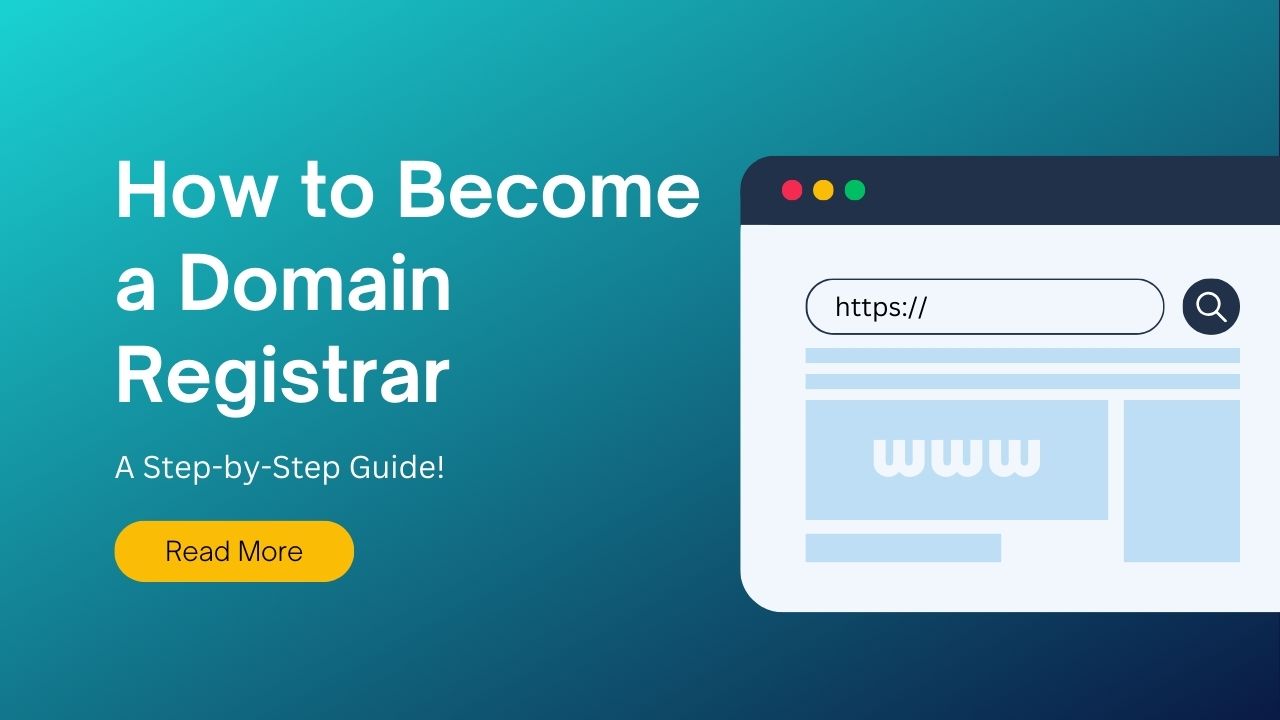In this article, I am going to tell you about How to Become a Domain Registrar. So if you want to know about it, then keep reading this article. Because I am going to give you complete information about it.
A domain registrar is a company or organization that allows individuals and businesses to register and manage domain names for their websites. Domain names are the human-readable addresses used to identify websites on the internet (e.g., example.com).
When you want to create a website, you need to register a unique domain name through a domain registrar. This registration involves paying a fee and providing contact information, including administrative and technical details. Once registered, you have the right to use that domain name for a specific period, usually annually, as long as you continue to renew the registration and pay the associated fees.
Domain registrars are accredited by the Internet Corporation for Assigned Names and Numbers (ICANN) and other domain name registries to sell domain names. They also provide services like domain transfer, domain renewal, and DNS management, allowing users to configure their domain settings, such as pointing the domain to a specific web hosting server or setting up custom email addresses associated with the domain.

Today’s article focuses on the same, i.e., “How to Become a Domain Registrar” The articles entail each bit of information necessary for you to know.
Let’s get started!✨
Table of Contents
What is ICANN
ICANN stands for the Internet Corporation for Assigned Names and Numbers. It is a non-profit organization responsible for coordinating and maintaining several key elements of the internet, such as domain names and IP (Internet Protocol) addresses.
ICANN was established in 1998 to help ensure the stable and secure operation of the internet’s unique identifier systems. This includes overseeing domain name system (DNS) management, which involves assigning domain names and IP addresses to ensure that computers can find each other on the internet. ICANN also accredits domain registrars, the companies or organizations that sell domain names to the public.
One of ICANN’s significant responsibilities is managing the top-level domains (TLDs) like .com, .org, .net, and country-code TLDs like .uk, .ca, and .jp. ICANN develops policies for the domain name system and provides a framework for dispute resolution between domain registrants. The organization plays a vital role in maintaining the global interoperability and stability of the internet.
How to Become a Domain Registrar
Becoming a domain registrar involves a series of steps and meeting specific requirements set by the Internet Corporation for Assigned Names and Numbers (ICANN) or other relevant regulatory bodies. Here’s a general overview of the process:
1. Understand the Requirements:
- ICANN Accreditation: ICANN is the organization responsible for managing domain name registrations. To become a domain registrar, you must be accredited by ICANN.
- Financial Stability: You need to demonstrate financial stability and the ability to operate a domain registration business.
- Technical Infrastructure: You must have the technical infrastructure to support domain registration and management, including servers, databases, and security measures.
- Legal Compliance: Ensure that you comply with all relevant laws and regulations related to domain registration and internet services.
2. Technical Setup:
- Servers: Set up reliable and secure domain name servers (DNS) to host the domains you register.
- Registrar Software: Develop or purchase domain registrar software that complies with ICANN standards.
- Security: Implement robust security measures to protect the domain registration process.
3. Legal and Business Setup:
- Register your business and obtain any necessary licenses and permits.
- Set up legal agreements and contracts for domain registration, including terms of service and privacy policies.
- Establish a customer support system to assist clients with domain-related issues.
4. Apply for ICANN Accreditation:
- Submit an application to ICANN for accreditation as a domain registrar. The application process involves demonstrating your technical and financial capabilities and your compliance with ICANN policies.
- Pay the necessary application fee.
5. Business Operations:
- Customer Support: Set up customer support services to assist clients with domain-related issues.
- Billing System: Establish a billing and payment system to manage domain registration fees.
- Marketing: Develop marketing strategies to attract customers and promote your domain registration services.
6. Compliance and Testing:
- Once your application is accepted, you’ll need to comply with ICANN policies and pass technical and operational tests to ensure your systems are capable of handling domain registrations securely and accurately.
7. Launch and Marketing:
- Launch your domain registration services to the public.
- Implement marketing strategies to attract customers. This might include competitive pricing, promotions, and excellent customer service.
8. Maintain Compliance:
- Continuously adhere to ICANN policies and regulations. Failure to comply can result in losing your accreditation.
9. Provide Excellent Customer Service:
- Offer excellent customer support to handle domain-related inquiries, issues, and registrations efficiently.
10. Stay Updated:
- Stay informed about industry trends, technology changes, and policy updates related to domain registration services.
Important Considerations:
Please note that the process and requirements might vary based on the specific regulations and policies of the country or region where you plan to operate. It’s essential to research and understand the local and international laws governing domain registration services.
Read also:)
- 10+ Best Domain Name Brokers: A-to-Z Guide for Beginners!
- How to Choose a Domain Name Registrar: The Beginner’s Guide!
- 15+ Best Domain Name Generators: A-to-Z Guide for Beginners!
So hope you liked this article on How to Become a Domain Registrar. And if you still have any questions or suggestions related to this, then you can tell us in the comment box below. Thank you so much for reading this article.
Thanks for giving me information. Your article is very helpful for everyone.